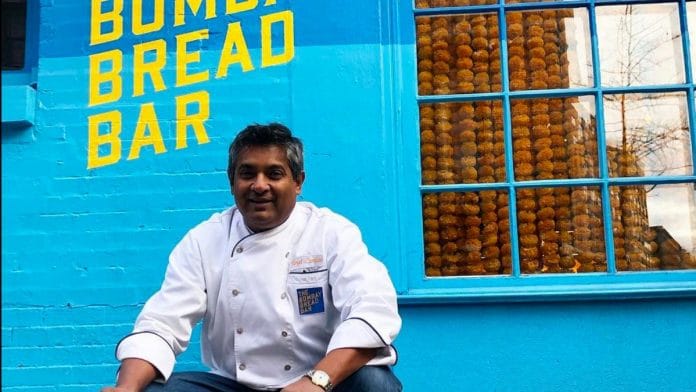Known for carrying the Indian food wave to New York, Floyd Cardoz was a master chef and international restaurateur. He managed to seamlessly blend together two distinct cultures through his food, earning him the moniker — the godfather of modern Indian cuisine.
“This is American food, viewed through a kaleidoscope of Indian spices. The flavours are so powerful, original and unexpected that they evoke intense emotions. Those who do not like Tabla tend to dislike it with a passion,” wrote American chef and food writer Ruth Reichl about Cardoz’s New York City restaurant Tabla in 1999. It was the first restaurant of that stature in the city that was led by a chef who was born and raised in India.
At Tabla, Cardoz gave Indian food the same treatment as French cuisine, it was elevated and refined but remained unmistakably Indian. Dishes included duck-and-potato samosa, tandoori quail with black-pepper glaze and mustard fettuccine with braised veal, baby spinach, and tomato kasundi.
“I remember walking into that restaurant and feeling this sense of pride that I had never felt as an Indian,” said Indian-American chef, Asha Gomez. The restaurant closed its doors in 2010 but it had cemented Cardoz’s reputation as a master of fusion.
Also Read: Puran Poli to pickles—In Dapoli, women are bringing home-chef revolution to Konkan food
Fun at the core of dining
Cardoz was known for creating restaurant experiences that lingered. From Mumbai’s beloved Bombay Canteen to O Pedro in the plush Bandra Kurla Complex — Cardoz used food as a vehicle to tell a story. The latter is a tribute to his home state of Goa. On the menu is an adapted version of his mother’s vindaloo and a dish inspired by the last meal he remembers his grandmother making for him — Margao Chorizo and Bacon Pulao topped with a fried egg.
“Goan food purists are always a little surprised when I say that my favourite Goan restaurant in the world is not in Goa but in Mumbai. It is O Pedro,” wrote Vir Sanghvi. “Floyd wanted it to be a love letter to Goa. He wanted to capture its sense of fun and the joy that Goans took in their food.”
Back in America, Cardoz opened Paowalla in 2016, which after two years, he transformed into The Bombay Bread Bar.
The pivot was led by the pursuit of fun, wrote food journalist Priya Krishna in The New York Times. He began Paowalla with the hopes of it being “accessible, craveable, nostalgic and meant for casual grazing” but it turned out to be rigid and formal. The course correction was emblematic, he was never afraid to close down something that didn’t fit his vision.
“People still don’t recognize Indian food for what it is. They’re not celebrating it like they should. So I’m willing to take that chance here,” Cardoz told Krishna.
All of his New York-based restaurants are now closed.
Also Read: Culture for one, taboo for another—MasterChef is now more Indian with Northeast on its plate
Winning competitions with upma
Born in Mumbai, Cardoz studied hospitality and then worked for the Taj Group of Hotels. He went on to study at the Les Roches International School of Hotel Management in Switzerland and immigrated to the US in 1988.
Cardoz was a four-time James Beard Award nominee and wrote two cookbooks. He also found acclaim on reality TV when he won season 3 of Top Chef Masters. The winning dish was his take on upma — cooked in chicken stock with kokum and wild mushrooms. Where Cardoz excelled, judges said, was in “taking home dishes and making them utterly elegant.”
The master chef’s final venture was Bombay Sweet Shop, an ode to childhood nostalgia. Boxes filled with indulgent, sinful mithai, all with a modern twist — hazelnut besan barfi, dulce de leche peda, strawberry ghevar — it’s fun, a hallmark of all his ventures. He travelled to Mumbai for its opening on 5 March 2020. Once he landed in New York, he wrote on Instagram that he was feeling unwell. It was 8 March 2020.
Cardoz died of Covid-19 two weeks later, on 25 March, at the age of 59, after decades in the food business. Cardoz had not only explored his personal history with food; he took it to uncharted territories.
Before his death, he was working on a line of Indian spice mixes with New York-based spice company Burlap & Barrel. With the help of his wife, Barkha Cardoz, the line was released in October 2021. Floyd’s legacy lives on.
(Edited by Theres Sudeep)






